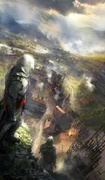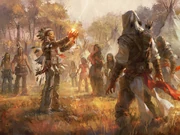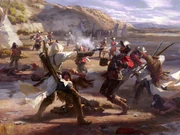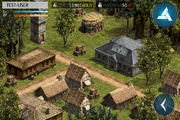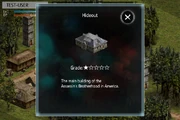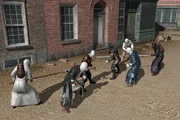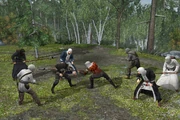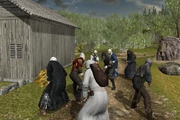
Assassin's Creed: Utopia logo
Assassin's Creed: Utopia was a cancelled mobile game developed in conjunction by Ubisoft Montreal[1] and Kabam[2] that was planned to be released exclusively through GREE, a Japanese social gaming platform focused on free-to-play apps available on Android and Apple iOS devices.
Development[]
News on the project first broke with an official press release from GREE on 21 February 2012. In it, the company announcing it had entered a partnership with Ubisoft to create a then-untitled mobile game[3] that was expected to release in December after GREE's full launch in Europe ended between April to June 2012.[4] However, details remained scant for months, with the only reliable information being that a game was in production, until mid-June shortly after E3 2012.[5]
In an interview with producer Andréane Meunier, video game website Pocket Gamer revealed the game's name to be Assassin's Creed: Utopia, while also sharing a piece of concept art, test footage screenshots, and early specifics. Utopia was set to take place at the start of the European colonial expansion into the Americas,[5] specifically with the establishment of the Roanoke Colony in 1586, and from there would follow the settlers as they endured for the next 150 years beyond the settlement's historically-documented failure.[6] Meunier made sure to mention that while Utopia's plot would lead into the broader American Revolution narrative of the then-upcoming Assassin's Creed III because of ending twenty years before the preceding Seven Years' War,[7] there would be no direct connections between games. Despite concerns on whether the Assassin's Creed series would be compatible on mobile to entice current smartphone gamers or convince long-time fans to switch systems,[5] particularly on a platform typically used for casual games that was little known outside Asia,[8] Meunier was sure GREE's reputation of crafting unique social experiences would benefit Ubisoft while still staying true to the brand's feel.[5]
The social aspect was but one reason why Ubisoft sought to work with GREE, since a feature with that level of interactivity was not present in the multiplayer elements for 2010's Assassin's Creed: Brotherhood or 2011's Assassin's Creed: Revelations. Another one was because of online customer research conducted by Ubisoft, which found that many Assassin's Creed fans did not play the console games. Seeking to draw more fans—particularly people whose experience with the series was limited to literature, or who were interested in the games' settings but disliked open worlds—Ubisoft decided to break from its partnership with Gameloft, which had produced all of its past mobile games, and turned to GREE's expertise running an online platform with a global userbase of nearly 230 million people by June 2012.[7]
The project was delayed for unspecified reasons, though, even after GREE's successful launch on 11 June.[9] Two months later, GREE made a press statement on 22 August announcing that it would attend the Tokyo Game Show from September 20–23, but did not directly name Utopia as one of their highlighted games.[10] It would be another two weeks before Utopia made its first appearance to media and ticketholders on 6 September during "Digital Days 2012",[11] Ubisoft's own internationally-covered[12][13] event in Paris, France focusing on new projects across all game systems. There, alongside booths promoting the latest working entries in other Ubisoft franchises like Tom Clancy's Ghost Recon and Rayman,[14] gameplay details were revealed and Utopia looked to be on track for its release date of winter 2012.[6][15]
Four days after Ubisoft's conference, the first playable demo was released in its pre-alpha stage, allowing select testers a glimpse into the game that had been vaguely hinted at for months and was projected to finally start official testing later that year.[16] On 14 September, GREE issued a press statement announcing Utopia as part of their game lineup for their appearance at the Tokyo Game Show.[17] A week later on 20 September, Utopia finally made its public debut,[18][19][20] where it was mentioned in interviews with GREE Executive Director Sanhisa Kotoke[21] and Ubisoft Japan Marketing Director Yoshihisa Tsuji.[22]
Following both conventions, however, Utopia suffered delays again, and as before, there was no statement on why or when fans could expect an update. By 6 November, a week after Assassin's Creed III's October debut, Utopia was still officially slated for an undefined winter release,[23] but nothing came by the year's end nor as February 2013 came to a close, earning GREE the dubious honor of surpassing their previous four month record of communications silence on the one-year anniversary of first announcing the game. This lack of news stretched for further months, indirectly confirming the game had been silently scrapped behind the scenes. Finally, on 7 November, nearly a full year after Utopia's intended release, Ubisoft Netherlands officially informed Dutch video game website Gamer.nl that the game was cancelled but did not elaborate further.[24]
Unfortunately, because this statement was given by a small branch instead of the larger Montreal studio that had helmed the project, this news and any reporting on it remained primarily restricted to non-English speaking European readers.[25] It would not be until 12 February 2017, over four years since English media had last covered anything on Utopia, that fans would learn what had befallen the game that was long plagued by undescribed issues. On that day, artist Lulu Zhang took to the American art site ArtStation to post two concept pieces she had been hired to produce, one with an Indigenous chief holding an Apple of Eden aloft before two Colonial Assassins, and another showing four Assassins protecting a tribe of Indigenous peoples of the Great Plains from an attack by soldiers in the Spanish army. In her comments, she said that the game's development "had been frozen", finally delivering closure on Utopia's fate.[2]
Gameplay[]
Utopia would have been a freemium real-time strategy game.[6] In the historical setting, a number of Assassins had stowed away aboard the ships that carried settlers to North America. Upon arriving at Roanoke Island, players would work on "building [their] own Assassin's Creed utopian colonial city"[5] in-between battling rival human or A.I.-controlled colonies[6] for resources, all while learning how the early Colonial Assassins "influenced history and helped shape the nation's original thirteen colonies".[15]
In test footage, the colony's buildings were designed in period-inspired American or European style and arranged in an isometric layout similar to other strategy games like Civilization or Age of Empires.[16] One resource players could collect was gold,[18] some of which could be acquired by tapping the sacks of coins[20] that hovered over the roofs of houses representing taxes paid by civilians. However, the demo did not go into detail on the features of other buildings like the watchtower or Assassin bureau from early screenshots.[18]
Players' military units could explore the map and engage other factions in 3D asynchronous brawls,[6] or could ally with friends to participate in "limited time epic battles".[15] Upon entering combat, a new screen would appear, split between the player's unit icons over a blue background on the left and the opposed units over a red background on the right. Both forces were arranged in their starting positions into a superimposed 3-x-3 white grid[20] as the Animus created a representation of a unit's weapon range on the battlefield and any viable targets.[16] From here, players could rearrange their units in various positions, keep the current troop layout, or even remove them beforehand to try and maximize any advantages,[20] especially as some units could attack multiple enemies at once. For example, in a basic line formation based on unit specialty, archers would be in the back, with axe-wielding fighters in the middle and spearmen in front to ward off oncoming assaults.[18] While only melee fighters were featured at the Tokyo Game Show, Marketing Director Yoshihisa said there were plans to include archers as well as units who wielded the series' iconic Hidden Blade, with the eventual goal of having ten different soldier classes to play with.[22]
Combat was turn-based in a style reminiscent of Final Fantasy, and presented players with three options to choose from. "Guard" set a unit in a defensive mode, while "Attack" triggered a more offensive action, and "Auto" let the game's A.I. decide all units' moves and ultimately the outcome of the skirmish.[16] If players opted to "Attack", any enemy spaces in range were highlighted in red, and the action would complete by either selecting the square and tapping "OK" in the HUD or double-tapping the target of choice. Their unit would then dash forward and act before retreating to their spot in formation. Players also had the option to "Cancel" the unit's action if they wanted.[19] The order of battle was based on individual unit speed to determine initiative,[18] as the strength of all units varied depending on their Attack, Defense, and Agility stats.[25]
Utopia would have also had unspecified "Abilities" that did not require energy systems like mana or cooldown timers, and over 100 different characters could be unlocked. As a freemium game, players had the option to spend real-world money to increase their progression by speeding up building time or gaining early access to exclusive characters and items.[6]
For the wider modern day framing device, Abstergo Industries had learned about the idyllic Assassin colony through their own research and had begun developing their newest project codenamed "Utopia".[5] Seeking to duplicate the colony's benefits into their plans for a New World Order, Abstergo relied on the success of the Animi Training Program that allowed employees to relive the genetic memories of unrelated individuals. By implementing that feature into "Utopia" and marketing it to the public as a game system, Abstergo could collect a vast amount of information by studying countless players' progression data as they to unknowingly furthered the Templars' goals through reliving the period when the colony was known to have existed before technically disappearing from historical record.[7]
Gallery[]
References[]
- ↑ Batchelor, James (6 September 2012). Assassin's Creed and Montreal studio headline Ubisoft's free-to-play line-up. MCV/Develop. Archived from the original on 10 September 2012. Retrieved on 26 July 2021.
- ↑ 2.0 2.1
 Storyboard illustration for Assassin's creed [sic] Utopia on Lulu Zhang's ArtStation profile "Which I did in for the AC mobile game "Utopia" in 2012 for Kabam and Ubisoft Montreal. Though the project had been frozen due to some reasons, I really enjoyed working for the team and the project."
Storyboard illustration for Assassin's creed [sic] Utopia on Lulu Zhang's ArtStation profile "Which I did in for the AC mobile game "Utopia" in 2012 for Kabam and Ubisoft Montreal. Though the project had been frozen due to some reasons, I really enjoyed working for the team and the project."
- ↑ GREE, Inc. (21 February 2012). GREE and Ubisoft® Team Up to Deliver New Assassin's Creed Mobile Game. GREE, Inc. Archived from the original on 25 May 2013. Retrieved on 11 June 2012.
- ↑ Yin-Poole, Wesley (21 February 2012). New Assassin's Creed mobile game exclusive to Gree. Eurogamer. Archived from the original on 24 February 2012. Retrieved on 26 July 2021.
- ↑ 5.0 5.1 5.2 5.3 5.4 5.5 Wilson, Will (13 June 2012). GREE and Ubisoft teaming up to bring Assassin's Creed Utopia to smartphones. Pocket Gamer. Archived from the original on 14 December 2012. Retrieved on 13 June 2012.
- ↑ 6.0 6.1 6.2 6.3 6.4 6.5 Brown, Mark (6 September 2012). Ubisoft reveals all on Assassin's Creed Utopia: a freemium city-building game for iOS and Android. Pocket Gamer. Archived from the original on 25 September 2019. Retrieved on 26 July 2021.
- ↑ 7.0 7.1 7.2 Purchese, Robert (21 June 2012). Assassin's Creed: Utopia won't link with AC3 beyond story. Eurogamer. Archived from the original on 23 June 2012. Retrieved on 21 June 2012.
- ↑ Andrew, Keith (13 June 2012). GREE's global platform the perfect base for 'hardcore' brands, claims Ubisoft. Pocket Gamer. Archived from the original on 23 December 2014. Retrieved on 26 July 2021.
- ↑ Andrew, Keith (11 June 2012). GREE begins assault on western gamers with new 'Come Play' promo site. Pocket Gamer. Archived from the original on 17 April 2014. Retrieved on 26 July 2021.
- ↑ GREE, Inc. (22 August 2012). GREE to Take the Stage at TOKYO GAME SHOW 2012. GREE, Inc.. Archived from the original on 9 December 2012. Retrieved on 26 July 2021.
- ↑ Rose, Mike (6 September 2014). New Assassin's Creed leads Ubisoft's mobile, F2P push. Gamasutra. Archived from the original on 10 September 2012. Retrieved on 26 July 2021.
- ↑
 Dome: Ubisoft Digital Days -videokollaasi on the Checkpoint TV YouTube channel
Dome: Ubisoft Digital Days -videokollaasi on the Checkpoint TV YouTube channel
Kauppinen, Jukka O. (19 September 2012). Assassin's Creed Utopia – ensikosketus mobiiliin taktiikka-assassinismiin (in Finnish). Muropaketti. Archived from the original on 7 November 2012. Retrieved on 26 July 2021. - ↑ "Game Solutions" (6 September 2012). Assassin's Creed krijgt strategische spin-off voor mobiel (in Dutch). Gamer.nl. Archived from the original on 24 March 2014. Retrieved on 26 July 2021.
- ↑ Agence Française pour le Jeu Vidéo (6 September 2012). Photographies: Ubisoft Digital Days 2012 (in French). Agence Française pour le Jeu Vidéo. Archived from the original on 10 September 2012. Retrieved on 26 July 2021.
- ↑ 15.0 15.1 15.2 Phillips, Tom (6 September 2012). Assassin's Creed Utopia is a city-building battler. Eurogamer. Archived from the original on 8 September 2012. Retrieved on 6 September 2012.
- ↑ 16.0 16.1 16.2 16.3 Gilmour, James (10 September 2012). Building cities, fighting rival settlers: Eyes-on with Assassin's Creed Utopia. Pocket Gamer. Archived from the original on 28 September 2019. Retrieved on 26 July 2021.
- ↑ GREE, Inc. (14 September 2012). GREE Announces Lineup and Schedule for TOKYO GAME SHOW 2012. GREE, Inc.. Archived from the original on 9 December 2012. Retrieved on 26 July 2021.
- ↑ 18.0 18.1 18.2 18.3 18.4 Frushtick, Russ (21 September 2012). 'Assassin's Creed: Utopia' blends city building with turn-based combat. Polygon. Archived from the original on 28 March 2013. Retrieved on 26 July 2021.
- ↑ 19.0 19.1 Gaskill, Jake (1 October 2012). GREE Booth At Tokyo Game Show 2012. G4TV. Archived from the original on 15 December 2012. Retrieved on 26 July 2021.
- ↑ 20.0 20.1 20.2 20.3 "Naoki" (20 September 2012). [TGS 2012]グリーブースレポート。新作RPG「Project Fantasm:A」を発表,「MGS」「モンハン」など32タイトルをプレイアブル展示 (in Japanese). 4Gamer.net. Archived from the original on 13 November 2012. Retrieved on 26 July 2021.
- ↑ "大陸新秩序" (1 November 2012). グリーの目指すコンシューマゲームとソーシャルゲームの関係,そしてゲームの未来とは? グリーの吉田大成氏と小竹讃久氏にいろいろ聞いてみた (in Japanese). 4Gamer.net. Archived from the original on 1 November 2012. Retrieved on 26 July 2021.
- ↑ 22.0 22.1 "川崎政一郎" (1 November 2012). グリーと協業する海外大手ゲーム会社3社と日本から海外を目指す1社に,「GREEのグローバル展開」についてインタビュー (in Japanese). 4Gamer.net. Archived from the original on 1 November 2012. Retrieved on 26 July 2021.
- ↑ Caoili, Eric (6 November 2012). Ghost Recon, digital growth driving Ubisoft revenues. Gamasutra. Archived from the original on 8 November 2012. Retrieved on 26 July 2021.
- ↑ Musters, Michel (7 November 2013). Assassin's Creed: Utopia geannuleerd (in Dutch). Gamer.nl. Archived from the original on 10 November 2013. Retrieved on 26 July 2021.
- ↑ 25.0 25.1 "AssassinsCreedCenter" (15 November 2013). Assassin's Creed: Utopia cancelado oficialmente (in Spanish). AssassinsCreedCenter. Archived from the original on 7 January 2016. Retrieved on 26 July 2021.

